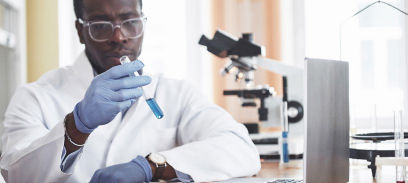By Ouedraogo Kouka, Community Member, Burkina Faso
In the past, getting tested for a disease at my local health center seemed almost impossible. People from my community had to travel long distances, sometimes hundreds of kilometers to get basic diagnostic services. These journeys weren’t just exhausting; they cost money, time, and valuable income. For many of us, it meant giving up a day’s work or more just to reach a facility that could run a simple test. But all that began to change when the Resolve to Save Lives project, coordinated by the African Society for Laboratory Medicine (ASLM), reached our region.
The Resolve to Save Lives project came at a critical time. Burkina Faso has faced growing challenges in disease surveillance and epidemic response. From limited diagnostic capacities to a lack of quality control and trained health workers, our laboratory system has many gaps-especially at the peripheral level where most people access care. Thanks to this project, supported through ASLM, we’ve seen a real shift in how healthcare and diagnostics are delivered to communities like mine.
During its implementation, the project supported 37 laboratories across 13 regions and 70 districts. These included health centers at all three levels of the national laboratory network-peripheral, intermediate, and national. For the first time, our health posts were equipped with rapid diagnostic tests (RDTs) for diseases that often go undetected until it’s too late, like Dengue, bacterial meningitis, and rotavirus-related diarrhoea.
One of the most important parts of the project was not just the delivery of reagents and supplies, but the training of healthcare workers. Nurses, lab technicians, and even community health staff were brought together for training on standard operating procedures (SOPs). As a community member, I can tell you-it makes a difference when the people taking care of us are properly trained. We now feel confident in the care we receive.
The health professionals understand not just how to perform the tests, but also how to interpret results, handle biohazards, and deliver care safely. I remember clearly when my neighbor fell ill with a fever. In the past, we might have waited days or made a long trip to the city. But this time, he was tested at our local clinic and diagnosed early with Dengue. He got treatment quickly and recovered without complications. That’s the difference diagnostics at the community level can make-it saves lives and livelihoods.
Beyond individual care, the project also brought broader change. It mapped 255 medical laboratories and assessed the national lab network through a “”One Health”” approach. This provided essential data for national planning. And critically, it enrolled 35 COVID-19 diagnostic labs in External Quality Assessment (EQA) programs, helping build a culture of quality and reliability in our testing systems.
What impressed many of us here was the coordination between health authorities and ASLM. From national policymakers to community clinics, everyone was involved. Training didn’t just stop at the city hospitals; they came to us, the people on the frontlines. The project even helped train 10 certified SPI-RT auditors and validated SOPs through real-world testing-a first for Burkina Faso. Of course, challenges remain. The number of facilities included had to be reduced from 160 to 37 due to budget constraints. And we know that full autonomy and resilience will take time. But now, we’ve seen what is possible. As a community member, I’m calling on our government and partners to keep building on what Resolve has started. Let’s extend training to all 70 districts. Let’s keep investing in peripheral health structures so we don’t go back to a time when testing meant sacrifice. The Resolve project didn’t just bring tests. It brought dignity, access, and hope to communities like mine. It brought diagnostics closer and in doing so, it brought healthcare within reach for all.
Thank you, ASLM, and all the partners who made this possible. We look forward to the day when every health post in Burkina Faso can diagnose and respond to disease threats without delay.

